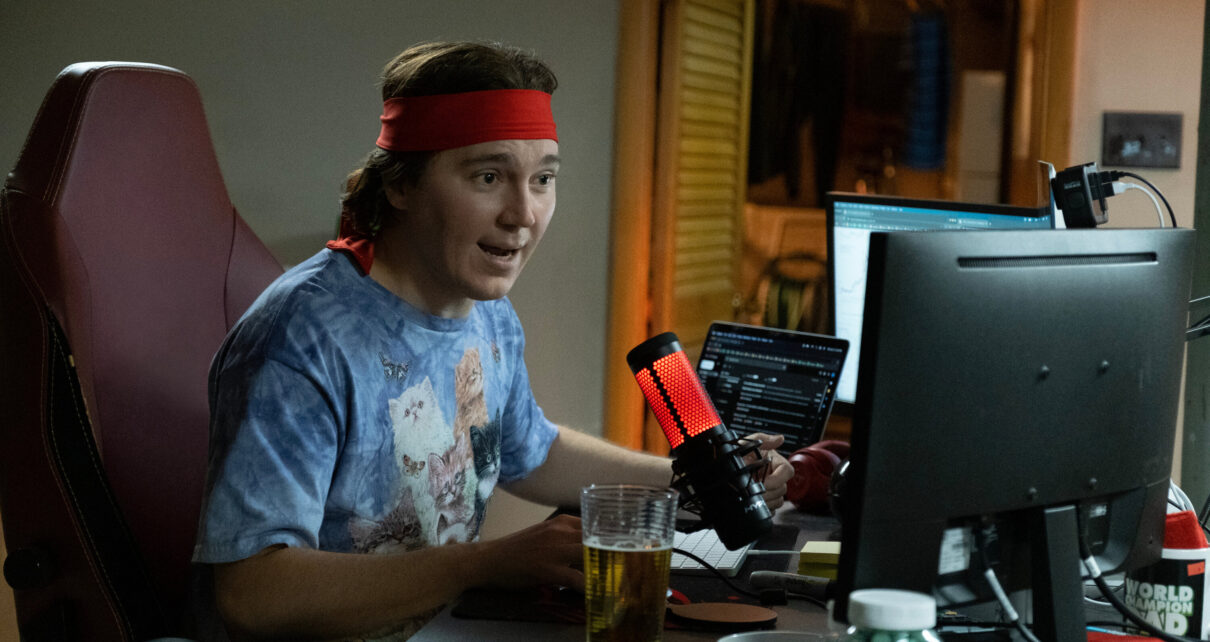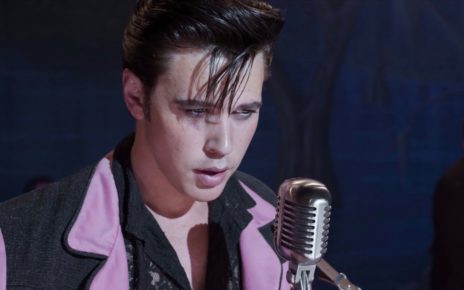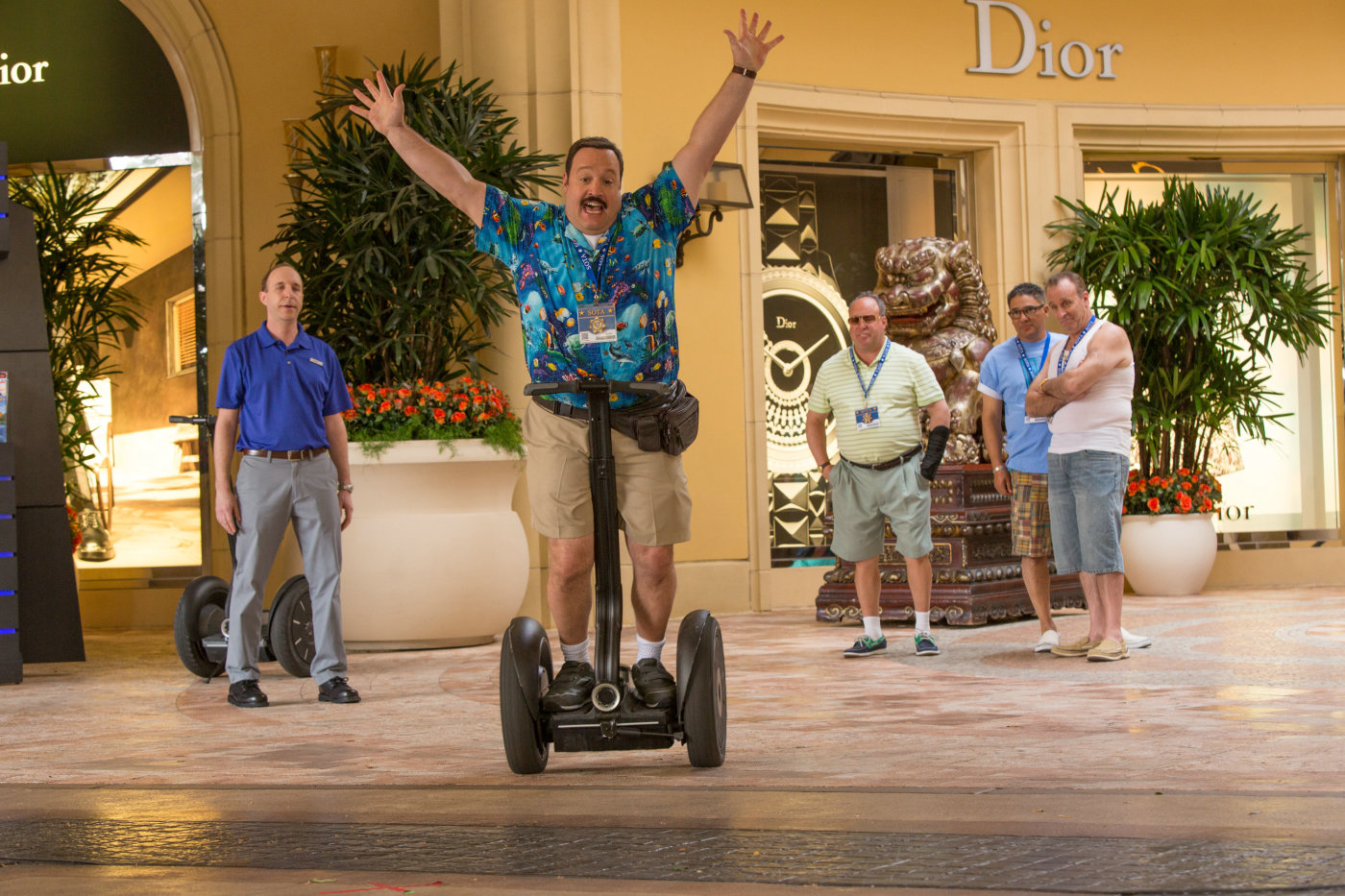Roaring Kitty. That’s our hero. “Roaring Kitty” a.k.a. Keith Gill (Paul Dano), a thirtysomething stock market outsider with a wife, a baby, a mortgage, and a ho-hum money market job. Online video persona Roaring Kitty was one of these guys who hosts his own investment show for kicks. And within this real-life story, not much happened in his world until he got bullish about GameStop.
Yeah, GameStop. That mall store selling used video game discs, cuz, you know, eBay doesn’t have an address. Have I ever bought something at GameStop? I’m Gen X; of course I have. Do I ever anticipate buying anything else at GameStop ever again? Of course not.
This is what the sharks banked on. Epitomized by billionaire Gabe Plotkin (Seth Rogen), the big money guys sold short on GameStop, essentially banking on the company going out of business. The problem with selling short is the losses can be unlimited if you are wrong. Billionaires being wrong on short sales is rare, to be sure, very rare in fact, but the potential exposure on selling short is unlimited. They all saw this in real time when the GameStop stock went from bargain basement $3.85/share to almost $400/share. And the freak who rallied the people? Roaring Kitty, a doof in a bandana and a cat t-shirt operating from his basement, like all respected economists.
The billionaires mockingly call them “Dumb Money,” essentially your average know-nothing American investor. That describes most of us. I think the film wants us to believe that describes all of us, even the billionaires; there are so many things we do not know about economic forces. But it doesn’t describe all of us, money-wise. There are many people who know how to invest and have developed the skill set to be good at it. And then there  are those who simply have enough money to dictate the game regardless of the opponent. It’s the same reason Trump never pays contractors – what are you gonna do, sue him? Doesn’t matter if he’s wrong; he has the resources to defeat you. The key to this particular gambit was that -for whatever reason—the Dumb Money amassed. The film shows this in the persons of America Ferrera, Anthony Ramos, Myha’la Herrold, and Talia Ryder as typical Americans who bought into Roaring Kitty’s rhetoric and pooled enough money to save the stock and defeat the short sellers. (In real life, these people numbered by the thousands because fighting a multi-billion-dollar short sale ain’t easy.)
are those who simply have enough money to dictate the game regardless of the opponent. It’s the same reason Trump never pays contractors – what are you gonna do, sue him? Doesn’t matter if he’s wrong; he has the resources to defeat you. The key to this particular gambit was that -for whatever reason—the Dumb Money amassed. The film shows this in the persons of America Ferrera, Anthony Ramos, Myha’la Herrold, and Talia Ryder as typical Americans who bought into Roaring Kitty’s rhetoric and pooled enough money to save the stock and defeat the short sellers. (In real life, these people numbered by the thousands because fighting a multi-billion-dollar short sale ain’t easy.)
Is Dumb Money any good? Well, it’s quite a Robin Hood tale. And the film is definitely on the side of Robin and his merry men. One of the bad guys here, ironically, named his investor firm after Robin Hood. I have the same problem here that I had with GameStop: Rise Of The Players (the documentary version of the same film): At the end of the day, this is still all about money, and nothing else. The film wants to expound upon the nobility of the little guy, and that’s fine if true, but here’s the thing – what’s next? Roaring Kitty is now worth millions upon millions. Do you see him failing to take a short position on an equally “noble” company? How about any of the Kitten-ettes? Do you see them donating their newfound riches to charity? No, of course not. It doesn’t make this a bad film, nor does it make them bad people (many are just “Average Joes” who made the right bet at the right time; that could be you); I just find it hard to get behind the players past a certain point because money is still money and money, by itself, will never be more to me than a tool. If this film were really about the players, we’d care about them more when the day was done.
For what it’s worth, the documentary was a better film. Dumb Money tried to short its own position by adding details like COVID and Pete Davidson, but I was more taken with the real-life players in the documentary than their actor alter-egos.
The real danger here is that this is the story of a win for the little guys based on a big guy tactic, emotional appeal instead of logic. Yeah, the billionaires lost big this time, but emotional appeal is their bread and butter. Why did we back GameStop? Because we like GameStop … and that one guy told us he liked it. There were some excellent reasons not to invest in GameStop in 2020: the company had gone through six CEOs in seven years and, more importantly, this is not the future of entertainment. How long before GameStop becomes Blockbuster? Five years? Ten years? One year? It’s just a matter of time. And in the interim, I guarantee the billionaires of America will have more than made up for their GameStop losses in legislation or lack thereof. The problem with this picture is the problem of almost every biography – the subject isn’t as compelling as I hoped and the villains either don’t get identified or don’t receive proper comeuppance … or both. Yeah, $1 Billion is a ton of money, and it will hurt, but if you’re worth billions, you’re still worth billions.
If you don’t know the GameStop story and have a feel for Robin Hood tales, Dumb Money is a decent watch. For me? Not only have I seen it. I’ve seen it better. And I hate rooting for Paul Dano.
There was a mad Roaring Kitty
Who lived in the skirts of The City
He bet on a dog
During our COVID slog
And now he’s just sitting pretty
Rated R, 105 Minutes
Director: Craig Gillespie
Writer: Lauren Schuker Blum, Rebecca Angelo, Ben Mezrich
Genre: Real life Robin Hood?
Type of being most likely to enjoy this film: Wall Street picketers
Type of being least likely to enjoy this film: Wall Street executives



